Desarrollamos proyectos propios de investigación y promovemos la interacción de académicos de diversas áreas de la economía, con particular énfasis en microeconomía.
Asimismo, difundimos los hallazgos y el aporte de la ciencia económica mediante la docencia y el desarrollo de iniciativas de diseminación.
Lima Summer School in Economics
Lima School of Economics, in association with Vancouver School of Economics, organizes the Lima Summer School in Economics on a yearly basis. Participants can attend mini courses on advanced and relevant topics in Economics taught by leading international researchers. Lima Summer School is a great opportunity for postgraduate and advanced undergraduate students in Latin America to interact with and learn from a world-class faculty. It also offers recent graduates and practitioners in economics the opportunity to develop and strengthen their areas of expertise.
Summer School 2020
The 2020 Lima Summer School in Economics will include the following topics: Empirical Methods in Causal Inference for Policy Analysts, Empirical Topics in Labour Economics: identification issues, minimum wages and the impacts of immigration, and Economic Evaluation Methods in Health: Cost-Benefit Analysis (CBA) and Cost-Effectiveness Analysis (CEA). The Faculty is composed by professors from Vancouver School of Economics as well as by associated members of Lima School of Economics.
Faculty members
- Dr. Sebastian Calonico is an Assistant Professor in the Department of Health Policy and Management at Columbia University. His research focuses on program evaluation and causal inference, applying innovative quantitative methods to the study of relevant empirical problems in an interdisciplinary context, including economics as well as other social, medical and statistical sciences. His work has been published in leading journals in economics and statistics, including Econometrica, Journal of the American Statistical Association, and Review of Economics and Statistics.Sebastian was born in Argentina, where he completed a B.A. in Economics at Universidad de Buenos Aires and an M.A. in Economics at Universidad Torcuato Di Tella. He later received a PhD in Economics from the University of Michigan, where he also obtained an MA in Statistics. Prior to joining Columbia University in 2019, he was a faculty member in the Department of Economics at the University of Miami.
- Dr. David Green is a professor in the Vancouver School of Economics at UBC. He received his BA from Queen’s University and his PhD from Stanford. His areas of research interest include income inequality, immigration, the impact of technical change on the labour market, and policies affecting labour market outcomes. He is a former editor of the Canadian Journal of Economics and an International Research Associate with the Institute for Fiscal Studies in London. He has served on the editorial boards for the American Economic Review and the Journal of Political Economy. His work has been published in leading journals, including Econometrica, the American Economic Review, and the Review of Economic Studies. He is currently the chair of a provincial committee investigating the applicability of the basic income to British Columbia.
- Dr. Alejandro Arrieta is Associate Professor of health economics in the Department of Health Policy and Management at Florida International University, Miami, USA. He has been faculty at the School of Public Health of Indiana University, Indianapolis, and consultant to the World Bank, Inter-American Development Bank, the Pan American Health Organization and the American Medical Association. He received his Ph.D. in Economics from Rutgers University and his BA in Economics from Pontificia Universidad Católica del Perú. Dr. Arrieta has an active research portfolio in health economics and economic evaluations in health. A branch of his research focuses on how physician behavior and incentives affect the quantity and quality of health services, and how that shapes the role of the private sector in the health systems of Latin America. Another area of his research focuses on the economic value of new medicines and technologies in cardiovascular diseases.
Summer School 2019
The 2019 Lima Summer School in Economics will include the following topics: Empirical Research in Economic History: Recent Topics and Methodologies, Economics of Strategy, and The Economics of Incentives in Public and Private Organizations. The Faculty is composed by professors from Vancouver School of Economics as well as by associated members of Lima School of Economics.
Summer School 2018
The 2018 Lima Summer School in Economics will include the following topics: Regression Discontinuity Designs, Empirical Analysis of Wage Differences: Discrimination and Decomposition Methods, and Behavioral Economics Applied to Healthcare. The Faculty is composed by professors from Vancouver School of Economics as well as by associated members of Lima School of Economics.
Summer School 2017
The 2017 Lima Summer School in Economics will include the following topics: Identification Issues in Applied Econometrics, Taxation and Pension System Reform, and Banking and Corporate Finance in Emerging Economies. The Faculty is composed by professors from Vancouver School of Economics as well as by associated members of Lima School of Economics.
Summer School 2016
The 2016 Lima Summer School in Economics included three courses: Economics of Nonrenewable Resources: Overview and Recent Developments; Economics of Competition Policy; and Advanced Topics in Policy Evaluation and Research Design in Economics. The Faculty of the 2016 edition was formed by professors from Vancouver School of Economics as well as by associated members of Lima School of Economics: Dr. Brian Copeland (PhD Stanford University), Dr. Thomas Ross (PhD University of Pennsylvania) and Dr. Jose Galdo (PhD. University of Syracuse).
The life-cycle growth of plants: The role of productivity, demand and wedges
Marcela Eslava - Universidad de los Andes
Priors rule: When do
malfeasance revelations help or hurt incumbent parties?
Pablo Querubín - New York University
Is the market on screen still the market?
Ramazan Gençay - Simon Fraser University
Optimal Bandwidth Choice for Robust Bias Corrected
Inference in Regression Discontinuity Designs
Sebastian Calonico - University of Miami
Exporting Uncertainty: The Impact of Brexit on Corporate America
Murillo Campello - Cornell University
School Quality and Behavioral Responses
Jorge Agüero - University of Connecticut
How Ownership Changes Affect Behavior and Outcomes: Evidence from Dialysis Facility Acquisitions
Ryan McDevitt - Duke University
Relational Mechanisms of Reconigtion in Peer-Based Tournament Rituals
Gino Cattani - NYU Stern
Repayment behaviour in group lending with unobserved types: An application to India
Resolving ambiguity as a public good:
Experimental evidence from Guyana
Sonia Laszlo - McGill University
Ninth Workshop for Young economists
The Lima School of Economics and the Economics Department of Universidad de Piura (UDEP), in collaboration with Vancouver School of Economics (University of British Columbia) are pleased toannounce the nineth UDEP Workshop for Young Economists.
Workshop 2022
In 2022, it will be held on August 18-19, at the Lima campus of UDEP.
Call for papersInternational Workshop for Young Economists
Este evento convoca a economistas peruanos que hayan completado recientemente su tesis doctoral o estén próximos a concluirla. El propósito es que presenten su investigación y la enriquezcan con los comentarios del resto de participantes. La periodicidad de este evento es bienal. Desde el primer workshop, más de 40 economistas de más de 25 universidades de Norteamérica y Europa han expuesto sus proyectos de tesis doctoral.
Workshop 2020
El VIII International Workshop for Young Economists se realizará de manera virtual el 6 y 7 de agosto de 2020. El plazo para el envío de papers se encuentra abierto hasta el 17 de Julio de 2020.
Ver más informaciónLimaSE Young Visiting Scholar Program
The economics department at Universidad de Piura aims to produce cutting-edge research in economics. As part of this goal, it has organized seven international workshops for young economists since 2007. To complement this effort, it is now inviting applications for its Second Young Visiting Scholar program, as we recognize the growing importance of gathering and connecting young scholars from the best academic institutions in the world.
The Young Visiting Scholar program offers the following benefits:
- Interaction and collaboration with faculty members and other local researchers
- Access to Peruvian data
- Private office (with facilities)
- Presentations in seminars
Call for applications 2020
This first call is for the period January-September 2020. The minimum length of the stay is three months. We may accept up to 2 visiting scholars.
Call for applicationsInternational Workshop for Young Economists
Este evento convoca a economistas peruanos que hayan completado recientemente su tesis doctoral o estén próximos a concluirla. El propósito es que presenten su investigación y la enriquezcan con los comentarios del resto de participantes. La periodicidad de este evento es bienal. Desde el primer workshop, 40 economistas de más de 25 universidades de Norteamérica y Europa han expuesto sus proyectos de tesis doctoral.
Workshop 2018
El VII International Workshop for Young Economists se realizará el 2 y 3 de agosto de 2018 en el marco del V Congreso Anual de la Asociación Peruana de Economía, el cual tendrá lugar en el campus Piura de la Universidad en Piura. El plazo para el envío de papers se encuentra abierto hasta el 30 de abril de 2018.
Los siguientes documentos presentan más información:
Call for papersExpositores del Workshop 2016
- Jorge Chávez
University of Warwick
"Local Export Spillovers in an Developing Country" (Descargar Paper) - Ricardo Piqué
Northwestern University
"Electoral Platforms and Local Development in Peru" (Descargar Paper) - Cristian Maravi
University of Rochester
“Labeling quits and layoffs under incomplete experience rating in the unemployment insurance system” (Descargar Paper) - Patricia Ritter
University of Chicago
"Soda Consumption in the Tropics: The Trade-Off between Obesity and Diarrhea in Developing Countries" (Descargar Paper)
- Cristina Tello-Trillo
Yale University
"The Impact of Trade on Managerial Incentives and Productivity" (Descargar Paper) - Sebastián Tello-Trillo
Vanderbilt University
"Effects of Losing Public Health Insurance on Healthcare Access, Utilization and Health Outcomes: Evidence from the TennCare Disenrollment" (Descargar Paper) - Giannina Vaccaro
University of Geneva
"How to Reduce the Unexplained Gender Wage Gap? Evidence from a Regression Discontinuity Design" (Descargar Paper)
Expositores del Workshop 2014
- Nicolas Bottan
University of Illinois at Urbana-Champaign
"Overcoming the Tyranny of History: Evidence from Post-Apartheid South Africa" - Renzo Castellares
University of Virginia
"Competition and Quality Upgrading in Export Markets: The Case of Peruvian Apparel Exports" - Gabriela Cuadra
University of California at Santa Cruz
"The impact of Labor Market Frictions on Exporting Firm"
- Fernando Fernandez
University of Calgary
"Electrification and Educational: Outcomes in Rural Peru" - Kristian López-Vargas
University of Maryland Sandro Parodi
"Promoting Pro-School Behavior through Reinforcement Messages" - Lucciano Villacorta
Center for Monetary and Financial Studies
"Estimating country heterogeneity in aggregate CES production functions"
Expositores del Workshop 2012
- Italo Gutiérrez
University of Michigan
"Does Unemployment Insurance Discourage on-the-job Search? Evidence from Older American Workers" - Manuel Hernández
Texas A&M University
"Group lending with heterogeneous types" - Luis Llosa
University of California - Los Angeles
"Terms of Trade in Small Open Economies: The Role of Monopolistic Output Markets" - Stanislao Maldonado
University of California – Berkeley
"Resource Curse, Political Support and Democratic Consolidation: Evidence from Peru"
- Fabrizio Orrego
Carnegie Mellon University
"Dedollarization and Financial Robustness" - Jean Paul Rabanal
University of California - Santa Cruz
"The Strategic Default with Neighbors: A Laboratory Experiment" - Fiorella Risso
Université Paris Dauphine
"La Formation des Aspirations Monetaires au Perou : Une Analyse des Processus d Adaptation et de Comparaisons Sociales " - Hannes Schwandt
Universitat Pompeu Fabra
"Wealth Schocks and Health Outcomes: Evidence from Stock Market Fluctuations"
Expositores del Workshop 2010
- Marcos Agurto
University of British Columbia
"The Role of Social Capital on Improved Cooking Stoves Usage Decisions in the Peruvian Andes" - Irma Arteaga
University of Minnesota
"The Relationship between Maternal Education and the Production of Cognitive Skills in Children: The Case of Peru" - Diether Beuermann
University of Maryland - College Park
"The Effect of Telecommunications Technologies on Agricultural Profits and Child Labor: Evidence from Isolated Villages in Peru" - Rodrigo Escudero
IESE Business School
"Private Information in Concentrated Markets with Forward Contracting" - Verónica Frisancho
Pennsylvania State University
"Signaling Creditworthiness in Peruvian Microfinance Markets: The Role of Information Sharing" - Verónica Frisancho
Pennsylvania State University
"Signaling Creditworthiness in Peruvian Microfinance Markets: The Role of Information Sharing"
- Gianmarco León
University of California - Berkeley
"Civil Conflict and Human Capital Accumulation: The Long Term Effects of Political Violence in Peru" - Oswaldo Molina
Oxford University
"Impact of Property Rights on Poor Households’ Investment Decisions: A Treatment Evaluation of a Titling Programme in Peru" - Eduardo Nakasone
University of Maryland - College Park
"The Impact of Land Titling on Labor Allocation: Evidence from Rural Peru" - Fabrizio Orrego
Carnegie Mellon University
"Demography and the Predictability of Savings: The Role of Socialization" - Alan Sánchez
Oxford University
"The Impact of Armed Conflict on Early Health and Nutrition in Peru"
Expositores del Workshop 2008
- Fernando Aragón
London School of Economics
"Candidate Selection and Quality of Politicians: Theory and Evidence from Latin America" - Miguel Angel Carpio
Universitat Pompeu Fabra
"Does Pension Saving Crowd Out Voluntary Saving? Evidence from Social Security Privatization in Peru" - Javier Coronado
Universitat Pompeu Fabra
"Can Competition Conditions and Market Structure Explain High Price Cost Margins in the Pharmaceutical Industry? The Case of Antihypertensives" - José Antonio Dorich
Universitat Pompeu Fabra
"Testing for Rule of Thumb Price Setting" - José Antonio Dorich
Universitat Pompeu Fabra
"The Welfare Losses of Price Rigidities"
- Roberto Duncan
University of Wisconsin-Madison
"Institutions and Cyclical Properties of Macroeconomic Policies" - Edwin Goñi
European University Institute
"The Determinants of Rising Informality in Brazil: Evidence from Gross Worker Flows" - Ruy Lama
UCLA
"Accounting for Output Drops in Latin America" - Arturo Ormeño
Universitat Pompeu Fabra
"Great Moderation Debate: Should We Worry about Using Approximated Policy Functions?"
Expositores del Workshop 2007
- Alejandro Arrieta
Rutgers University-New Brunswick
"Effect of Market Structure on Health Quality in the New Jersey Hopsital Industry" - Juan Carlos Bisso
University of Virginia
"Optimal Agency Contracts: The Effect of Vicarious Liability and Judicial Error" - Paul Castillo
London School of Economics
"An Estimated Stochastic General Equilibrium Model with Partial Dollarization: A Bayesian Approach" - Ana Cecilia Dammert
Syracuse University
"Heterogeneous Impacts of Conditional Cash Transfers: Evidence from Nicaragua" - José Antonio Dorich
Universitat Pompeu Fabra
"Resurrecting the Role of Real Money Balance Effects" - Roberto Duncan
University of Wisconsin-Madison
"Is the Relationship between the US Current Account and Output Symmetric?"
- José Galdo
Syracuse University
"Training Quality and Earnings: The Effects of Competition on the Provision of Public-Sponsored Training Programs" - Ruy Lama
UCLA
"Optimal Monetary Policy in a Small Open Economy under Segmented Asset Markets and Sticky Prices" - Carlos Montoro
London School of Economics
"Inflation Premium and Oil Price Volatility" - Hugo Ñopo
Northwestern University
"Economic Experiments to Measure Trust and Reciprocity in 6 Latin American Cities" - Miguel Robles
UCLA
"Aggregate Effects of Imperfect Tax Enforcement" - César Serra
UCLA
"Macro-Finance Implications of a General Equilibrium Model with Agency Costs"
Año 2021
Cabral, L., & Natividad, G.
Bundling Sequentially Released Durable Goods. Forthcoming, Journal of Industrial Economics.Garmaise, M. J., & Natividad, G.
Financial Flexibility: At What Cost? Journal of Financial and Quantitative Analysis, 56(1), 249-282.Carpio, Miguel Angel & Guerrero, María Eugenia
Did the Colonial Mita Cause a Population Collapse? What Current Surnames Reveal in Peru. The Journal of Economic History, 2021, 81(4), 1015-1051.
Año 2020
Cabral, L., & Natividad, G.
Movie release strategy: Theory and evidence from international distribution. Journal of Economics & Management Strategy, 29(2), 276-288.Salazar, L., Aramburu, J., Agurto, M., Maffioli, A., & Fahsbender, J.
Sweeping the flies away: evidence from a fruit fly eradication program. European Review of Agricultural Economics, 47(5), 1920-1962.
Año 2019
Natividad, Gabriel
"Stunted firms: The long-term impacts of colonial taxation". Journal of Financial Economics, 2019, Volume 134, Issue 3, pp. 525–548.Agurto Adrianzén, Marcos; Fiestas, Hugo; Nuñez, Wenceslao; Quevedo, Valeria and Vegas, Susana
"Study-group diversity and early college academic outcomes: Experimental evidence from a higher education inclusion program in Peru". Economics of Education Review, 2019, Volume 72, pp. 131–146.Vera, Celia P.
"A Structural Approach to Assessing Retention Policies in Public Schools". The B.E. Journal of Economic Analysis & Policy, 2019, Volume 19, Issue 3, pp. 1–26.
Año 2018
Martínez-Carrasco, Miguel A. and Amodio, Francesco
"Input Allocation, Workforce Management and Productivity Spillovers: Evidence From Personnel Data". The Review of Economic Studies, 2018, Volume 85, Issue 4, pp. 1937–1970.Salas, Vania and Patel-Campillo, Anouk
"Un/associated: Accounting for gender difference and farmer heterogeneity among Peruvian Sierra potato small farmers". Journal of Rural Studies, 2018, Volume 64, pp. 91–102.
Año 2017
Garmaise, Mark and Natividad, Gabriel
"Consumer Default, Credit Reporting and Borrowing Constraints". Journal of Finance, 2017, Volume 72, Issue 5, pp. 2331–2368.Neelsen, Sven and O'Donnell, Owen
"Progresive universalism? The impact of targeted coverage on health care access and expenditures in Peru". Journal of Health Economics, 2017, Volume 26, Issue 12, pp. 1479–1868.Bernal, Noelia; Carpio, Miguel and Klein, Tobias
"The effects of access to health insurance: Evidence from a regression discontinuity design in Peru". Journal of Public Economics, 2017, Volume 154, pp. 122–136.
Año 2016
Natividad, Gabriel
"Quotas, Productivity, and Prices: The Case of Anchovy Fishing ". Journal of Economics & Management Strategy, 2016, Volume 25, Issue 1, pp. 220–257Cabral, Luis and Natividad, Gabriel
"Cross-selling in the US home video industry". The RAND Journal of Economics, 2016, Volume 47, Issue 1, pp. 29–47.Natividad, Gabriel and Rawley, Evan
"Interdependence and Performance: A Natural Experiment in Firm Scope". Strategy Science, 2016, Volume 1, Issue 1, pp. 12–31Fracassi, Cesare, Garmaise, Mark, Kogan, Shimon and Natividad, Gabriel
"Business Microloans for U.S. Subprime Borrowers". Journal of Financial and Quantitative Analysis, 2016, Volume 51, Issue 1, pp. 55–83Cabral, Luis and Natividad, Gabriel
"Box-Office Demand: The Importance of Being #1". The Journal of Industrial Economics, 2016, Volume 64, Issue 2, pp. 277–294Garmaise, Mark and Natividad, Gabriel
"Spillovers in Local Banking Markets". Review of Corporate Finance Studies, 2016, Volume 5, Issue 2, pp. 139–165.DeRose, Laurie F.; Huarcaya, Gloria; Salazar-Arango, Andrés; Agurto, Marcos; Corcuera, Paúl; Gonzalvo-Cirac, Marga and Tarud, Claudia
"Children’s Living Arrangements and On-time Progression Through School in Latin America and the Caribbean". Journal of Family and Economic Issues, 2017, Volume 38, Issue 2, pp. 184-203.Martínez-Carrasco, Miguel A.
"Behavioral Spillovers in Organizations: A Selective Review", in Sebastian J. Goerg, John R. Hamman (ed.) Experiments in Organizational Economics (Research in Experimental Economics, Volume 19). Emerald Group Publishing Limited, (2016) pp. 251-280
Año 2015
Natividad, Gabriel and Sorenson, Olav
"Competitive threats, constraints, and contagion in the multiunit firm." Organization Science 26 (2015): 1721-1733
Año 2014
Agurto Adrianzén, Marcos
"Social capital and improved stoves usage decisions in the Northern Peruvian Andes." World Development 54 (2014): 1-17.Bernal, Noelia and Vermeulen, Frederic
"The impact of an increase in the legal retirement age on the effective retirement age." De Economist 162.2 (2014): 115-145.Natividad, Gabriel
"Integration and productivity: Satellite-tracked evidence." Management Science 60.7 (2014): 1698-1718.
Año 2013
Agurto Adrianzén, Marcos
"Improved cooking stoves and firewood consumption: Quasi-experimental evidence from the Northern Peruvian Andes." Ecological Economics 89 (2013): 135-143.Calvo, Cesar and Dercon, Stefan
"Vulnerability to individual and aggregate poverty." Social Choice and Welfare 41.4 (2013): 721-740.Garmaise, Mark J. and Natividad, Gabriel
"Cheap credit, lending operations, and international politics: The case of global microfinance." The Journal of Finance 68.4 (2013): 1551-1576.Natividad, Gabriel
"Financial capacity and discontinuous investment: Evidence from emerging market multibusiness firms." The Review of Financial Studies 26 (2013): 2375-2410.Natividad, Gabriel
"Financial slack, strategy, and competition in movie distribution." Organization Science 24 (2013): 846-864.Natividad, Gabriel
"Multidivisional strategy and investment returns." Journal of Economics & Management Strategy 22 (2013): 594-616
Do immigrants take or create natives\' jobs? Evidence of Venezuelan immigration in Peru
Celia P. Vera - Bruno JiménezAcademic Aptitude Signals and STEM field participation: A Regression Discontinuity Approach
Marcos Agurto - Sandra Buzinsky - Siddharth Hari - Valeria Quevedo - Sudipta Sarangi - Susana VegasEmpowering College Students through Community Engagement: Experimental Evidence from Peru
Marcos Agurto - Sandra Buzinsky - Fernando Fernandez - Javier TorresWe exploit a randomized control trial involving 131 fellows of a higher education scholarship program, who study at the same university. Half of the students were randomly assigned to a youth community engagement initiative and acted as academic ambassadors in the diffusion of an electronic wallet in their local communities. They received training on leadership, teamwork and financial literacy. Also, their role as agents of change in their communities was constantly emphasized. They later delivered training and information sessions about the new electronic wallet to members of their local communities. Treated female students show positive effects regarding attitudes of empowerment, self-efficacy, motivation, and community engagement. On average, treated female students report being more appreciated by their community members, have a stronger sense of commitment towards their community, and report higher levels of self-efficacy. They also experience improved academic performance, measured in GPA and academic credits successfully completed. We do not find the same effects for treated male students.
Descarga el documento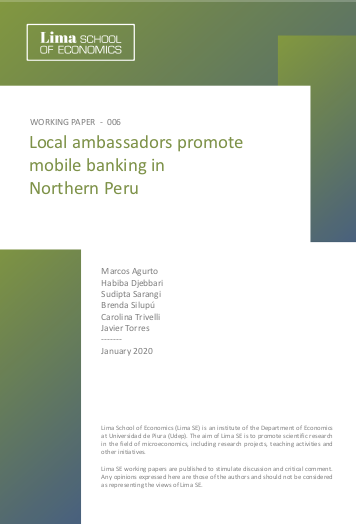
Local ambassadors promote mobile banking in Northern Peru
Marcos Agurto - Habiba Djebbari - Sudipta Sarangi - Brenda Silupú - Carolina Trivelli - Javier TorresWe experiment with a novel way to boost information acquisition that exploits existing social ties between the promoter of a new financial technology and community members. We offer information and training workshops on a new mobile-money platform in periurban and rural areas in Peru. In the treatment group, workshops are led by promoters who are personally known to the invited participants. In the control group, comparable individuals are invited to attend similar workshops, but the workshops are led by agents external to the community. Our findings suggest that lack of information impedes product adoption, which is itself limited by lack of trust in the individual who provides the information.
Descarga el documento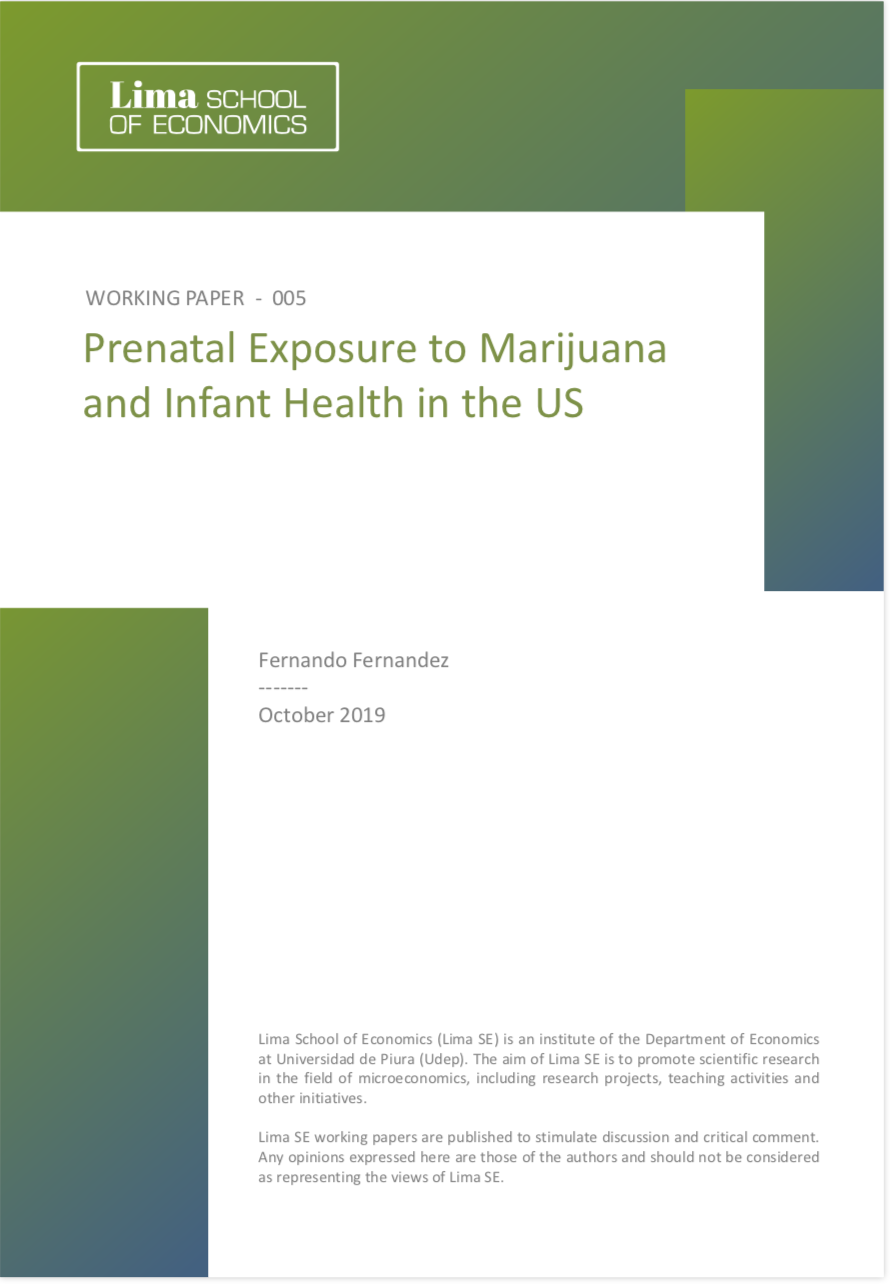
Prenatal Exposure to Marijuana and Infant Health in the US
Fernando FernandezThis study evaluates the consequences of increased marijuana exposure during pregnancy on infant health in the US. Unlike previous studies on the impacts of marijuana, which rely on state-level variation to identify their effects of interest, I exploit county-specific measures of cannabis prenatal exposure using data on the precise location and opening date of every cannabis dispensary (legal point of sale for marijuana) in the country. Estimations based on state-level measures of increased marijuana access suggest no adverse impact on infant health. In addition, the estimated effects exploiting county-level variation in the opening dates of cannabis dispensaries, suggest that higher prenatal exposure to cannabis is unrelated to changes in infant health, once I control for county fixed effects and state-specific trends. Additional evidence from an event-study analysis with similar controls, corroborates that increased availability of marijuana during pregnancy is not linked to changes in infant health.
Descarga el documento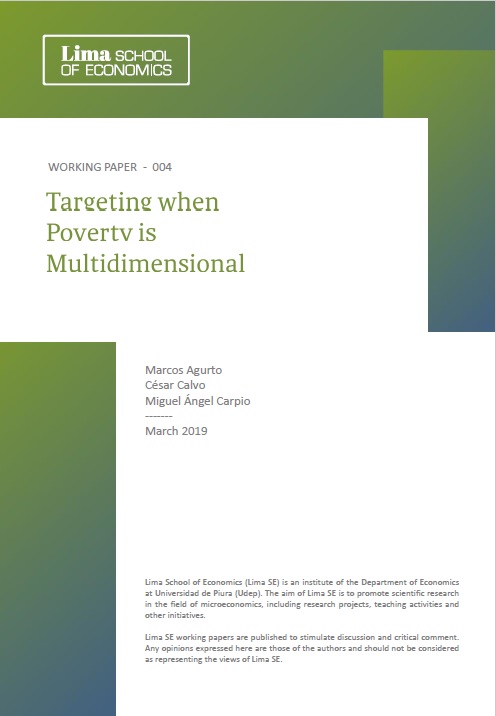
Targeting when Poverty is Multidimensional
Marcos Agurto - César Calvo - Miguel Ángel Carpio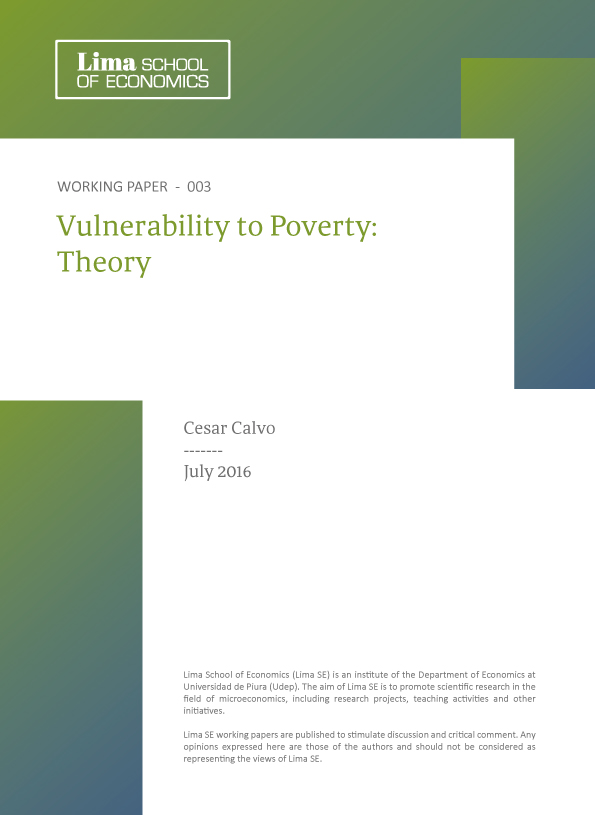
Vulnerability to Poverty: Theory
César CalvoTwo competing strands exist within the theoretical literature on vulnerability to poverty, each with its own policy implications. Vulnerability may be seen as low expected utility and thus stress the danger of self-perpetuating poverty, as the poor shy away from risky, yet necessary decisions to escape their hardship. Alternatively, vulnerability is often construed as expected poverty and provides policy-makers with a forward-looking viewpoint that both sheds light and raises new questions on how best to formulate the targeting of social spending. This paper provides an overview of the theoretical work underpinning each of these competing views.
Descarga el documento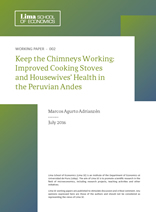
Keep the Chimneys Working: Improved Cooking Stoves and Housewives\'Health in the Peruvian Andes
Marcos Agurto AdrianzénThis paper examines the effects of long term improved cooking stoves (ICS) usage on selfreported eye irritation symptoms and respiratory health in the Northern Peruvian Andes. To identify the effect of ICS, we exploit field data related to the quasi-random distribution of ICS with faulty iron frames. Our results indicate that ICS long term usage, with an operative chimney, reduces respiratory illnesses and eye discomfort symptoms among housewives. It is also shown that in the case of respiratory health, other household members may benefit from reduced household air pollution (HAP) exposure.
Descarga el documento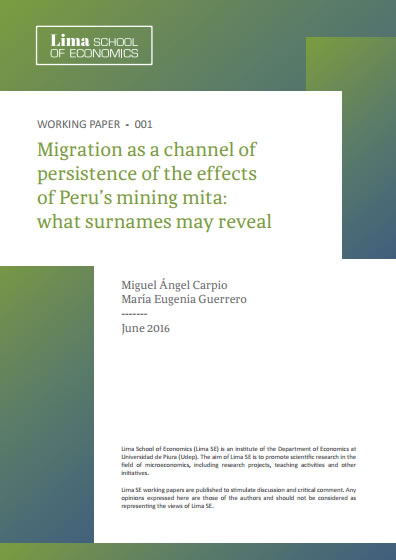
Migration as a channel of persistence of the effects of Peru’s mining mita: what surnames may reveal
Miguel Ángel Carpio - María Eugenia GuerreroThis paper proposes three indicators constructed from the surnames of the current population to analyze the effect of mita, a forced mining labor system in Peru and Bolivia during 1573 and 1812, on historical migration. The underlying assumption is that surnames within a community might be the same over time unless migration or mortality displacement takes place. The mita case is particularly appealing for applying our indicators because the use of surnames was introduced in the study region only since the Spanish conquest in 1532. We estimate the effect of mita by using a regression discontinuity design similar to the one conducted by Dell (2010), which exploits the exogenous variation in its geographic assignment.
Descarga el documento